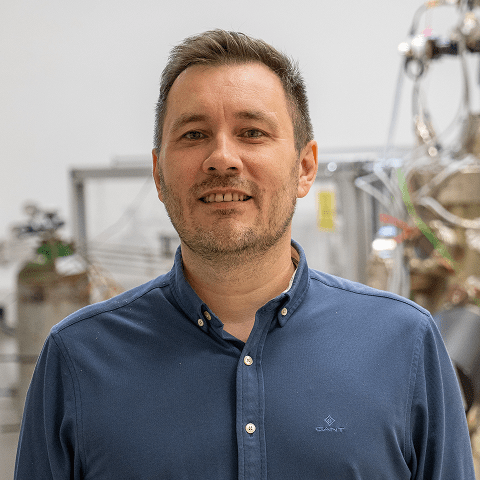Marián Mikula, doc. Ing., PhD.
Researcher, Scientific Research Department
Manager of Detached Department Turany

Bio
Researcher and since 2018 associate professor at the Department of Experimental Physics, FMPI CU. Currently an employee of CENAM. Expert in physical deposition technologies and nanostructure design of hard coatings based on TM nitrides and TM diborides. The area of expertise includes structural analysis and mechanical properties of thin films and coatings. In the educational field, he will focus on physical metallurgy and physical methods of preparing thin films.
Specialization research areas
Hard coatings Nanostructured materials Thin ceramic films Transmission electron microscopy Analysis of chemical composition Structure analysis Nitrides X-ray diffraction Scanning electron microscopy Mechanical and tribological properties Oxidation resistance Ball-on-disc Thermal stability Transition metal diborides NanoindentationEducation
Habilitation thesis: Hard nanostructured coatings
PhD thesis: Hard and superhard coatings based on titanium
Diploma thesis: Preparation and properties of wear-resistant ceramic based on B4C
Reviewer activities
Acta Materialia, Scripta Materialia, Materials and Design, Surface and Coatings Technology, Thin Solid Films, Vacuum, Journal of Alloys, and Compounds
Journal of Vacuum Science and Technology A
Other activities
Society for New Materials and Technologies
Slovak Silicate Society
Scientific Council in Institute of Materials and Machine Mechanics
Awards
Great Researcher Award – Institute of Materials and Machine Mechanics
Projects
National
Teaching activities
Courses taught
Course Objectives
In the first part, the student will gain knowledge in the field of phase transformations in technical materials. They will get acquainted with the formation of solid solutions, with nucleation and conditions of intergrain interfaces and their influence on the shape of crystals, with their temperature stability, with the influence of point defects on the structure of solid solutions. He will also gain knowledge about solidification of alloys, diffusion and non-diffusion transformations, shape memory and decomposition mechanisms, precipitation. In the second part, they will get acquainted with the conditions of deformation behavior of alloys, with the influence of dislocations and surface defects on the strengthening of materials. The student will understand the concept of nanostructured materials from the point of view of mechanical behavior and will also gain a comprehensive idea of fracture mechanics, material creep and material fatigue.
Syllabus
Point defects in lattices, solid solutions, nucleation, surface strains, Wulff shape. Phase transitions in solid solutions. Solidification, dendrites. Peritectic, monotectic, eutectic, eutectoid transformations. TTT diagrams, martensitic transformation. Intermediate phases. Steels, alloying. Precipitation, spinodal decomposition in alloys, phase segregation. Dislocation mechanisms. Deformation mechanisms, strengthening. Tensile test. Stacking faults, Grain boundaries. Fracture mechanics, creep, material fatigue.
Prerequisite Courses
Structure and mechanical properties of solids (2-FTL-107/15)
Course Objectives
The student will first get acquainted with the technical possibilities of achieving vacuum, its measurement and control of working gases. He will gain a comprehensive knowledge of physical methods of preparation of thin films (evaporation, sputtering, arc evaporation, pulsed laser deposition), where he will be explained in detail the physical aspects of the processes. The student will gain information about the growth of thin films, the influence of deposition parameters on the structure and properties of films. In the last part he will be introduced to the possibilities of creating functional structures in films using ion treatment and lithographic methods.
Syllabus
vacuum pumps, scales and flow controllers, Langmuir probe, mass spectroscopy, evaporation, DC and RF sputtering, magnetron, glow discharge, plasma parameters, high energy pulses (HiPPMS), pulsed laser deposition, laser optics, ablation mechanism, arc evaporation, cathode macroparticle filtering, thin film growth, surface energy, thermodynamic nucleation model, zonal models, texture, epitaxy, focused ion beam, nanotubes, electron lithography, optical lithography
Course Objectives
The student will gain knowledge in the field of preparation, structure, and properties of technical materials. In the introductory part of the course, they will get acquainted with amorphous/crystalline materials, with point defects in materials, dislocations and surface defects, their influence on mechanical properties. It will also focus on phase transformations in solid solutions, steels, and non-ferrous alloys, on heat treatment methods and its influence on mechanical properties. The student will get a comprehensive idea of material fatigue, of material creep. They will also learn basic information about structural ceramics and thin ceramic films and how to prepare them and their properties.
Syllabus
Basic construction of materials, defects in lattices, dislocation mechanisms. Deformation mechanisms, strengthening. Tensile test, Surface defects, Grain boundaries. Solid solutions, Phase transformations in solid solutions. Steels, and their alloying. Peritectic, monotectic, eutectic, eutectoid transformations. IRA, ARA diagrams, martensitic transformation. Precipitation, spinodal decomposition in Al alloys. Structural ceramics – oxides, carbides, borides, powder metallurgy, thin films, creep, fracture mechanics, material fatigue.
Students supervision
Supervisor of bachelors, master, and PhD. students.